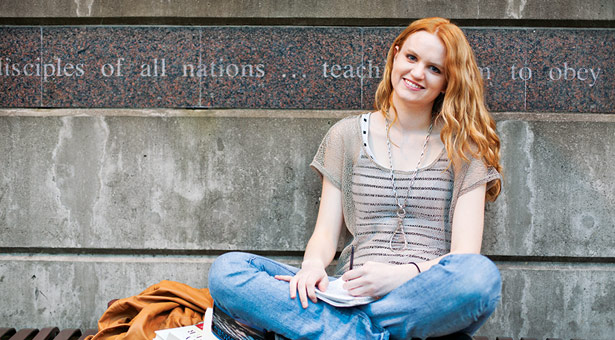The City Urban Perspectives
UScholar Brings Refugees’ Story to Life
Immersive Journalist
By Jeffrey Overstreet (jeffreyo@spu.edu) | Photo by Luke Rutan

Megan Hoye, now a journalist for The Palm Coast Observer, says, “I don't pretend that I'd have this job if it wasn't for my [UScholars] honors project.”
In Kent, Washington, time was running out for a family of refugees. Originally from Burma, the family of four had resettled in the United States three months earlier, fleeing violence and persecution from the Myanmar military. How long does the U.S. government offer financial support to refugees? Three months.
Parents Dolla and Helen were still recovering from their previous four years in Kuala Lumpur — their “Malaysian nightmare” — where 35 people including their children, Albert and Rachel, shared a one-room apartment, and Albert was imprisoned for working illegally. Now, they were racing against time to make America their permanent home.
“They're the most gracious, generous people,” says Megan Hoye '12, who spent three months documenting the family's life for her senior-year honors project. All students participating in Seattle Pacific University's honors program, UScholars, craft extensive research projects that represent the culmination of their studies. Hoye, an English major, put classroom lessons to work as she wrote in-depth articles about the refugees' experience.
She found Dolla and Helen through World Relief, a nonprofit humanitarian aid organization that helps refugees resettle. She went through World Relief's employee orientation, including a background check, to prepare for her work as a journalist.
Four days a week, Hoye travelled 40 minutes south to Kent to spend time with the family, who had barely enough food and very little else. She joined them in shopping, World Relief office visits, English classes, and “hanging out.” She even attended the Chin-Burmese Community Church. “They're a lot less reserved in their worship than I'm used to,” she says.
“On the day that their funding ended,” says Hoye, “Helen got a job in Bellevue. She's a hotel housekeeper. Dolla has a job as well. They're doing a lot better. They recently got a computer. Now, I can email them.”
What did Hoye's immersive approach achieve? There's a difference, she says, between reading statistics about refugee populations and reading a story about one family's struggles. “Narrative
journalism has the potential to draw readers into sympathetic relationships with the people they're reading about.”
It has also changed her. She gained experience in maintaining a journalist's boundaries — serving not as a helper but as a witness. “I also learned a lot about the world and my place in it,” she says. “Never make assumptions about people when you meet them, because you don't know their story or their struggles until you take the time to find out.”
She's taken these lessons with her as she began a new job this autumn as a reporter for the Palm Coast Observer near Daytona Beach, Florida, writing features and news stories daily.
Since the move, she misses the dinners with Helen's and Dolla's family. “We've definitely bonded, and I want to keep the connection for years to come.”
